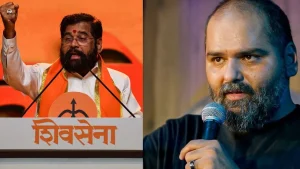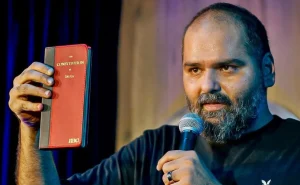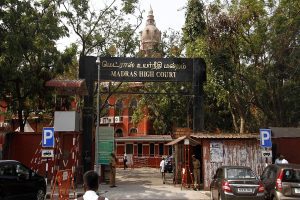Maharashtra – In a significant development within India’s entertainment and political spheres, stand-up comedian Kunal Kamra Pre-Arrest Bail Granted by the Madras High Court until April 7, 2025. This legal relief pertains to a case filed against him in Mumbai concerning a parody song that allegedly mocks Maharashtra Deputy Chief Minister Eknath Shinde. The court’s decision underscores the ongoing discourse surrounding freedom of expression and the boundaries of political satire in India.
Background of the Controversy

Kunal Kamra, renowned for his incisive and often provocative comedic style, performed a satirical piece titled “Naya Bharat” during a show at a comedy club in Mumbai’s Khar area. The performance, which took place in January 2025, featured a parody song set to the tune of a popular Hindi film track from “Dil Toh Pagal Hai.” The lyrics of this parody included the term “gaddar” (traitor), a term frequently used by the Shiv Sena (Uddhav Balasaheb Thackeray) faction to describe Eknath Shinde following his political realignment in June 2022. The video of this performance was released online recently, reigniting political tensions. The controversy has gained momentum, making Kunal Kamra Pre-Arrest Bail Granted a widely discussed issue.
Legal Proceedings and Bail Application
Following the video’s release, multiple First Information Reports (FIRs) were lodged against Kamra in Mumbai, accusing him of defamation and inciting enmity through his satirical content. Facing potential arrest and citing threats to his safety, Kamra sought transit anticipatory bail from the Madras High Court, asserting his inability to approach courts in Maharashtra due to the prevailing circumstances. Kunal Kamra Pre-Arrest Bail Granted status has been a crucial development in this legal battle.
Justice Sunder Mohan of the Madras High Court, acknowledging the comedian’s concerns, granted interim anticipatory bail until April 7, 2025. The court mandated that Kamra execute a bond to the satisfaction of the judicial magistrate at Vanur in Villupuram district, Tamil Nadu. Additionally, notices were issued to the Tamil Nadu government and the Khar Police Station in Mumbai, with the next hearing scheduled for April 7. Kunal Kamra Pre-Arrest Bail Granted signifies the judiciary’s balanced approach to free speech and legal accountability.
Reactions from Political Entities
The parody has elicited strong reactions from supporters of Eknath Shinde’s Shiv Sena faction. In response to Kamra’s performance, members of this faction reportedly vandalized the comedy club and the hotel where the show was held. These actions highlight the heightened sensitivities surrounding political satire in the current climate. Kunal Kamra Pre-Arrest Bail Granted remains at the center of this heated debate.
Implications for Freedom of Expression


This incident has reignited debates about the limits of freedom of expression in India, especially concerning political satire. Kamra’s supporters argue that satire is a legitimate form of critique and an essential component of democratic discourse. Conversely, detractors contend that such performances can be defamatory and incite unrest, particularly when they target political figures. Kunal Kamra Pre-Arrest Bail Granted serves as a benchmark for evaluating these arguments.
Legal Perspectives on Satire and Defamation
Under Indian law, satire occupies a complex position. While the Constitution guarantees freedom of speech and expression under Article 19(1)(a), this right is subject to reasonable restrictions, including those pertaining to defamation, public order, and decency. Legal experts note that determining whether a satirical piece crosses into defamation involves assessing intent, content, and the potential impact on public perception. Kunal Kamra Pre-Arrest Bail Granted offers a case study in this ongoing legal discourse.
The Role of the Judiciary


The judiciary plays a pivotal role in balancing individual freedoms with societal interests. In granting interim anticipatory bail to Kamra, the Madras High Court has provided temporary relief while acknowledging the need for a thorough examination of the allegations. This approach reflects the judiciary’s attempt to uphold constitutional freedoms without undermining the rule of law. Kunal Kamra Pre-Arrest Bail Granted sets an important legal precedent in this regard.
Public Discourse and Media Coverage
The case has garnered extensive media attention, with opinions divided along political and ideological lines. Some view Kamra’s satire as a courageous act of dissent, while others perceive it as a disrespectful affront to political leadership. This polarization underscores the challenges in navigating the intersection of comedy, politics, and public sentiment in India. Kunal Kamra Pre-Arrest Bail Granted has become a focal point in this debate.
Historical Context of Political Satire in India
Political satire has long been a crucial element of India’s social and political landscape. During the colonial era, Indian satirists used print media, poetry, and street theater to mock British rule. Newspapers like “Harijan” and “Kesari” featured sharp critiques of colonial policies, often through humor. Post-independence, cartoons by artists like R.K. Laxman became a powerful tool to highlight government inefficiencies and societal issues. Kunal Kamra Pre-Arrest Bail Granted fits into this historical tradition of challenging authority through satire.
In modern India, satirical programs on television, YouTube, and social media have gained prominence. Stand-up comedians such as Varun Grover, Aditi Mittal, and Sanjay Rajoura have often incorporated political and social satire into their routines, challenging mainstream narratives. However, with the rise of digital media, satirists have increasingly faced legal and political backlash, demonstrating the precarious position of comedy in contemporary India. Kunal Kamra Pre-Arrest Bail Granted highlights this ongoing struggle.
The Digital Age and Amplification of Satirical Content
The advent of digital platforms has amplified the reach of satirical content, enabling comedians like Kamra to disseminate their work to a broader audience. While this democratization of content distribution fosters diverse voices, it also increases the potential for controversy, as content can quickly go viral and attract varied interpretations. Kunal Kamra Pre-Arrest Bail Granted showcases the power and risks associated with digital-age satire.
Also Read: Immigration and Foreigners Bill 2025 Passed – A Landmark Move for National Security
Potential Outcomes and Future Implications
As the legal proceedings continue, the outcome of Kamra’s case could set a precedent for how political satire is treated under Indian law. A ruling in favor of Kamra may reaffirm the importance of freedom of expression, while an adverse judgment could signal increased constraints on satirical content. Regardless of the outcome, the case is likely to influence the landscape of political comedy in India. Kunal Kamra Pre-Arrest Bail Granted is being closely watched for its broader impact.
Concluding Statements
Kunal Kamra Pre-Arrest Bail Granted until April 7, 2025, marks a critical juncture in the ongoing dialogue about freedom of expression and the role of satire in Indian democracy. As the nation watches closely, the proceedings will undoubtedly contribute to the broader discourse on the boundaries of artistic expression and the resilience of democratic values in the face of political controversy. Kunal Kamra Pre-Arrest Bail Granted remains a defining issue in India’s legal and cultural landscape.

